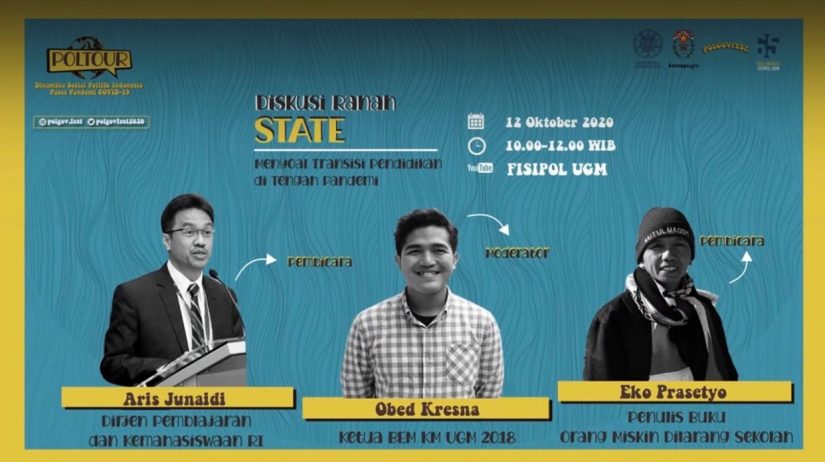
Yogyakarta, October 12th 2020—The 65th Fisipol UGM Dies Natalis celebration is more festive with the Politic and Government Student Corps (KOMAP) event called Politico Tour or better known as Poltour. As an annual program held by the Department of Government and Politics, Poltour that is usually done by visiting many government organizations is now changed into an online webinar event. Taking the theme of Indonesia’s social and political dynamics after the pandemic, Poltour is hoped to be a place to think critically together on the issue of the pandemic. This webinar series has three focuses; the state (12 october 2020), intermediary (13 october 2020), and society (14 october 2020).
On the first day, Poltour focused on the topic of the state by raising the sub-theme of the transition of education in the middle of the pandemic. There were two main speakers in the first day event which were Aris Junaidi (The Director of Learning and Student Affairs, University Education Directorate, Ministry of Education and Culture) and Eko Prasetya (Writer of ‘Orang Miskin Dilarang Sekolah’). The webinar started with Eko Prasetya starting the discussion by elaborating his arguments related to the sub-theme. For eko, the education transition in the middle of the pandemic caused a lot of changes, especially when it comes to interaction patterns. First, people’s perspective tends to be partial because of the massive digital interaction. Second, the massive interaction is also caused by a wider public area and the lack of limitation of space. Therefore, the interaction pattern is now limitless. Third, these changes affect the increase of anarchic and free information which are outside of the state’s control.
For example, a couple days ago, a lot of university students held a demonstration. Eko said that this is a real example that education is in a critical situation. In this case, the discussion about power is normalized. Eko highlighted the fact that we need to be adaptive to the changes caused by the covid-19 pandemic. In the education sector, as was mentioned by Eko, at least there are five aspects that is lost in the online learning process; the awareness of one’s potential and uniqueness (there’s anonymity in the online education process), the management of self confidence and how to present oneself, a social awareness that one is always connected to the social environment, the skill to develop social relations, as well as the decision to take a choice and be responsible. The online education process, Eko reflected, also diminishes the expertise concept which is caused by the domination of social media as a channel to access information and knowledge.
Meanwhile, representing the Ministry of Education and Culture, Aris Junaid talks more about the Ministry’s spending in order to make adjustments for the education in the middle of the pandemic. Aris explained that the ministry has accommodated online learning by allowing access for university students to take online modules that they see are interesting. This policy is implemented since 9 March 2020 alongside the Ministry’s implementation of work from home which is then followed by study from home policy. Aris also explained that the education transition in the middle of the pandemic needs to be accompanied by a curriculum reorientation according to the university departments’ needs.
The real proof of the ministry’s contribution are by creating an online learning platform for university students (https://spada.kemendikbud.go.id), a platform for university students with the lack of online resources (https://kuliahdaring.kemendikbud.go.id), providing free internet access, holding online capacity training for professors in preparing for online course materials, accommodating intra-university credit acknowledgement, as well as using international MOOC. Aris also said that the Ministry of Education and Culture have spent 7 trillion in providing internet access for teachers and students.
